Cognitive Behavioral Therapy for Smoking Cessation
VerifiedAdded on 2023/01/04
|6
|1458
|37
AI Summary
Cognitive Behavioral Therapy (CBT) is a therapeutic treatment prescribed for termination of dependence in individuals with compulsive smoking habits. This article discusses the strategies involved in CBT for smoking cessation and presents studies that demonstrate its effectiveness. It also explores the combination of CBT with other treatments for specific populations. The article concludes that CBT, when combined with medication or incentives, can be a promising alternative to medication alone for smoking cessation.
Contribute Materials
Your contribution can guide someone’s learning journey. Share your
documents today.
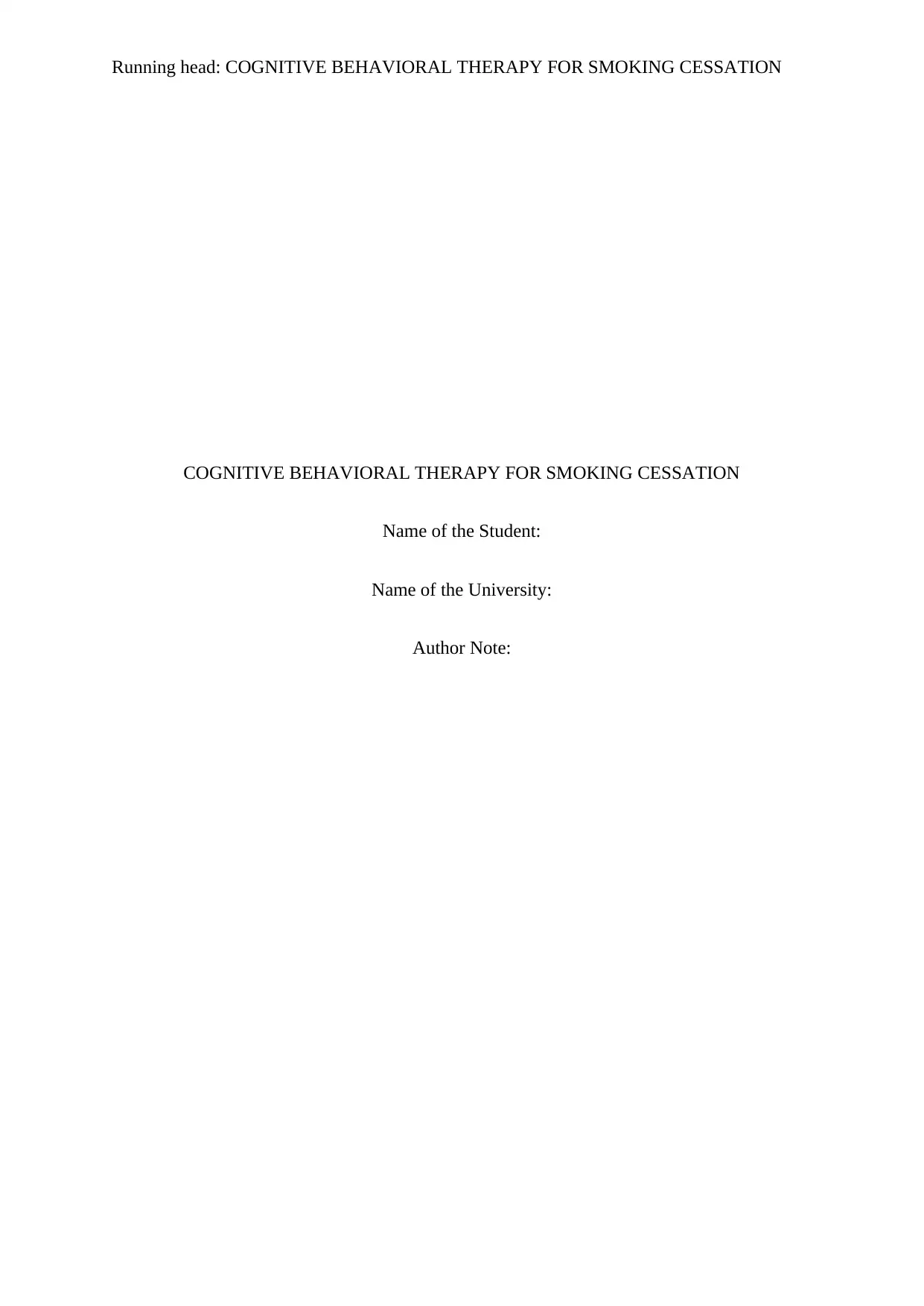
Running head: COGNITIVE BEHAVIORAL THERAPY FOR SMOKING CESSATION
COGNITIVE BEHAVIORAL THERAPY FOR SMOKING CESSATION
Name of the Student:
Name of the University:
Author Note:
COGNITIVE BEHAVIORAL THERAPY FOR SMOKING CESSATION
Name of the Student:
Name of the University:
Author Note:
Secure Best Marks with AI Grader
Need help grading? Try our AI Grader for instant feedback on your assignments.
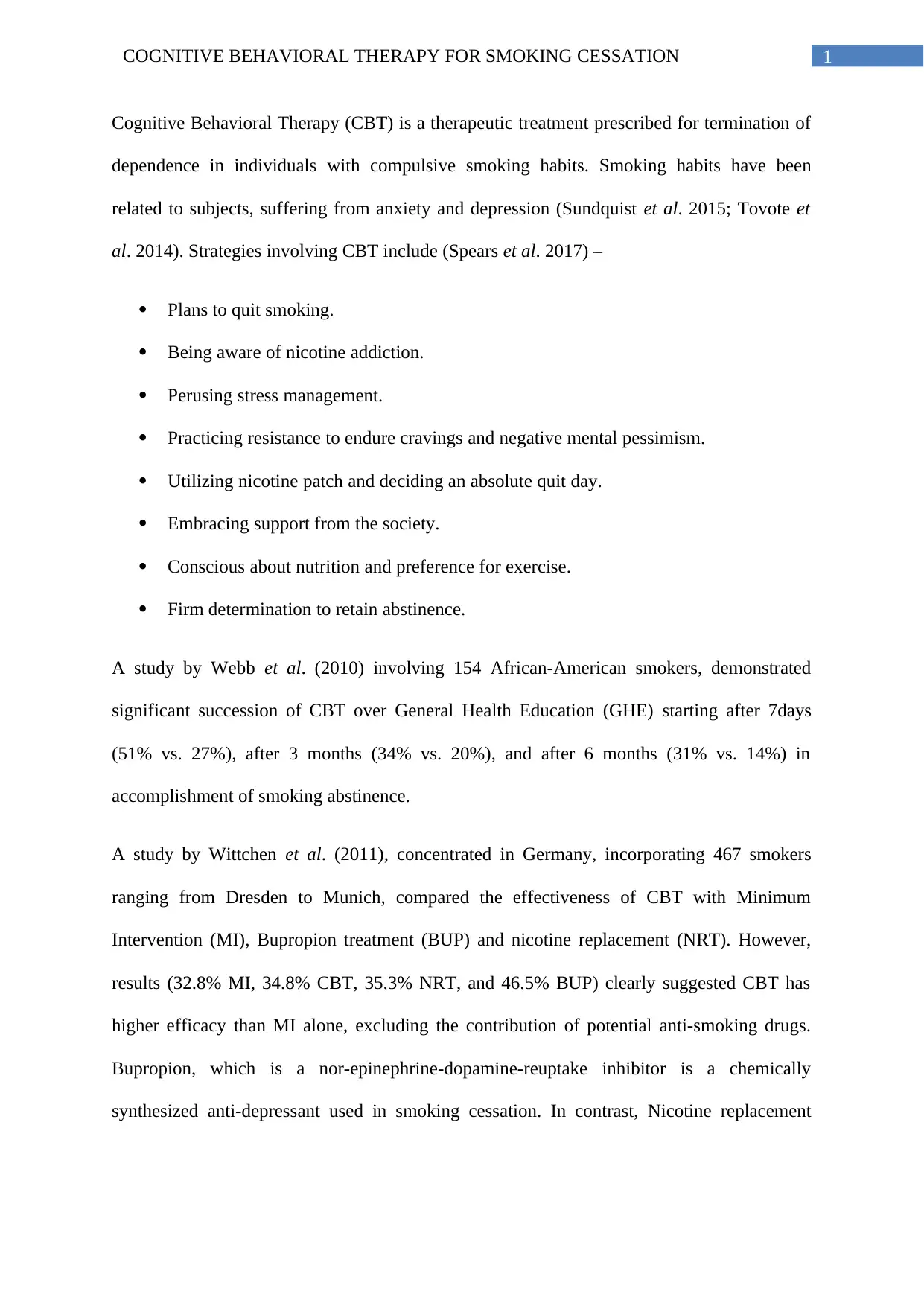
1COGNITIVE BEHAVIORAL THERAPY FOR SMOKING CESSATION
Cognitive Behavioral Therapy (CBT) is a therapeutic treatment prescribed for termination of
dependence in individuals with compulsive smoking habits. Smoking habits have been
related to subjects, suffering from anxiety and depression (Sundquist et al. 2015; Tovote et
al. 2014). Strategies involving CBT include (Spears et al. 2017) –
Plans to quit smoking.
Being aware of nicotine addiction.
Perusing stress management.
Practicing resistance to endure cravings and negative mental pessimism.
Utilizing nicotine patch and deciding an absolute quit day.
Embracing support from the society.
Conscious about nutrition and preference for exercise.
Firm determination to retain abstinence.
A study by Webb et al. (2010) involving 154 African-American smokers, demonstrated
significant succession of CBT over General Health Education (GHE) starting after 7days
(51% vs. 27%), after 3 months (34% vs. 20%), and after 6 months (31% vs. 14%) in
accomplishment of smoking abstinence.
A study by Wittchen et al. (2011), concentrated in Germany, incorporating 467 smokers
ranging from Dresden to Munich, compared the effectiveness of CBT with Minimum
Intervention (MI), Bupropion treatment (BUP) and nicotine replacement (NRT). However,
results (32.8% MI, 34.8% CBT, 35.3% NRT, and 46.5% BUP) clearly suggested CBT has
higher efficacy than MI alone, excluding the contribution of potential anti-smoking drugs.
Bupropion, which is a nor-epinephrine-dopamine-reuptake inhibitor is a chemically
synthesized anti-depressant used in smoking cessation. In contrast, Nicotine replacement
Cognitive Behavioral Therapy (CBT) is a therapeutic treatment prescribed for termination of
dependence in individuals with compulsive smoking habits. Smoking habits have been
related to subjects, suffering from anxiety and depression (Sundquist et al. 2015; Tovote et
al. 2014). Strategies involving CBT include (Spears et al. 2017) –
Plans to quit smoking.
Being aware of nicotine addiction.
Perusing stress management.
Practicing resistance to endure cravings and negative mental pessimism.
Utilizing nicotine patch and deciding an absolute quit day.
Embracing support from the society.
Conscious about nutrition and preference for exercise.
Firm determination to retain abstinence.
A study by Webb et al. (2010) involving 154 African-American smokers, demonstrated
significant succession of CBT over General Health Education (GHE) starting after 7days
(51% vs. 27%), after 3 months (34% vs. 20%), and after 6 months (31% vs. 14%) in
accomplishment of smoking abstinence.
A study by Wittchen et al. (2011), concentrated in Germany, incorporating 467 smokers
ranging from Dresden to Munich, compared the effectiveness of CBT with Minimum
Intervention (MI), Bupropion treatment (BUP) and nicotine replacement (NRT). However,
results (32.8% MI, 34.8% CBT, 35.3% NRT, and 46.5% BUP) clearly suggested CBT has
higher efficacy than MI alone, excluding the contribution of potential anti-smoking drugs.
Bupropion, which is a nor-epinephrine-dopamine-reuptake inhibitor is a chemically
synthesized anti-depressant used in smoking cessation. In contrast, Nicotine replacement
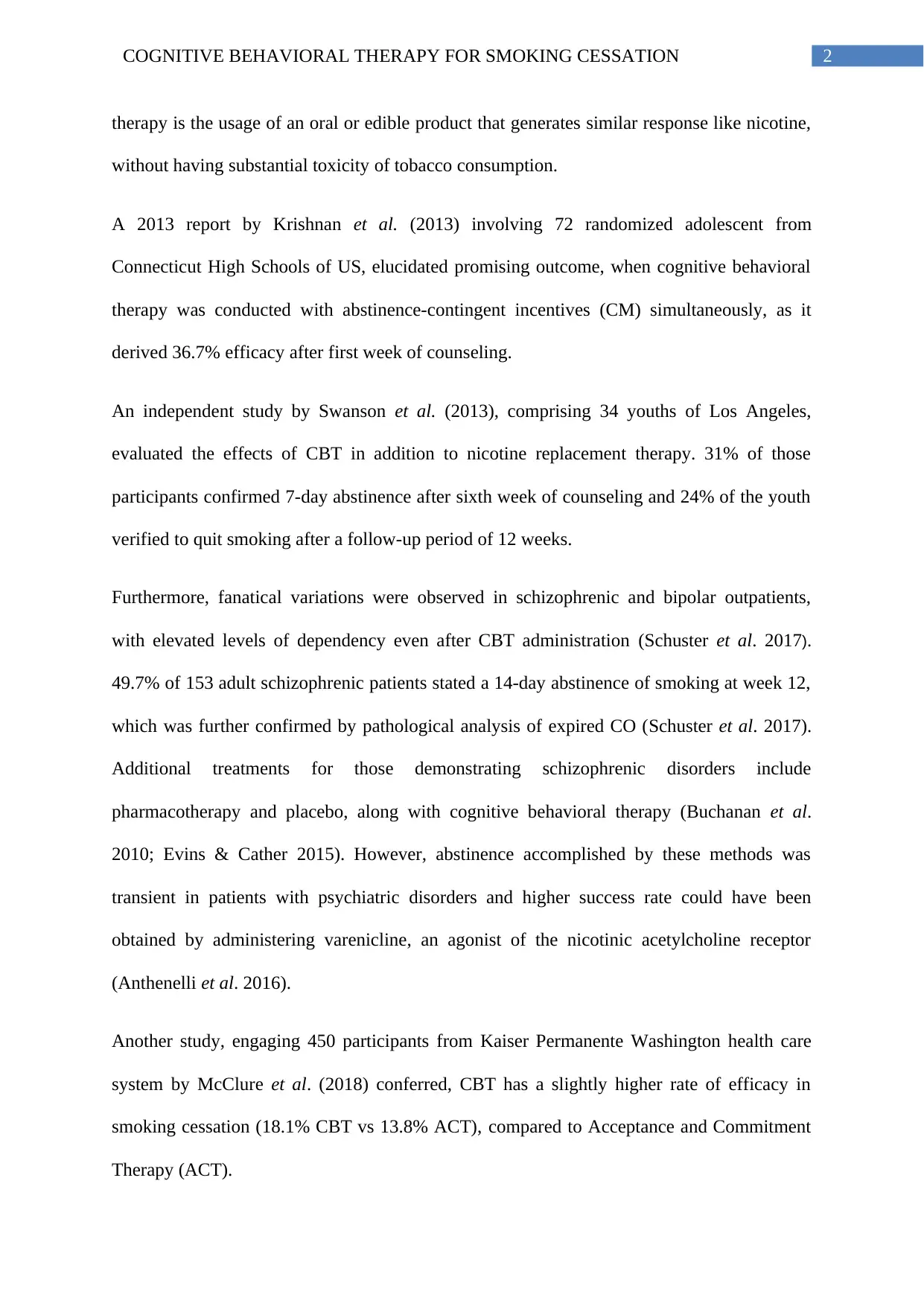
2COGNITIVE BEHAVIORAL THERAPY FOR SMOKING CESSATION
therapy is the usage of an oral or edible product that generates similar response like nicotine,
without having substantial toxicity of tobacco consumption.
A 2013 report by Krishnan et al. (2013) involving 72 randomized adolescent from
Connecticut High Schools of US, elucidated promising outcome, when cognitive behavioral
therapy was conducted with abstinence-contingent incentives (CM) simultaneously, as it
derived 36.7% efficacy after first week of counseling.
An independent study by Swanson et al. (2013), comprising 34 youths of Los Angeles,
evaluated the effects of CBT in addition to nicotine replacement therapy. 31% of those
participants confirmed 7-day abstinence after sixth week of counseling and 24% of the youth
verified to quit smoking after a follow-up period of 12 weeks.
Furthermore, fanatical variations were observed in schizophrenic and bipolar outpatients,
with elevated levels of dependency even after CBT administration (Schuster et al. 2017).
49.7% of 153 adult schizophrenic patients stated a 14-day abstinence of smoking at week 12,
which was further confirmed by pathological analysis of expired CO (Schuster et al. 2017).
Additional treatments for those demonstrating schizophrenic disorders include
pharmacotherapy and placebo, along with cognitive behavioral therapy (Buchanan et al.
2010; Evins & Cather 2015). However, abstinence accomplished by these methods was
transient in patients with psychiatric disorders and higher success rate could have been
obtained by administering varenicline, an agonist of the nicotinic acetylcholine receptor
(Anthenelli et al. 2016).
Another study, engaging 450 participants from Kaiser Permanente Washington health care
system by McClure et al. (2018) conferred, CBT has a slightly higher rate of efficacy in
smoking cessation (18.1% CBT vs 13.8% ACT), compared to Acceptance and Commitment
Therapy (ACT).
therapy is the usage of an oral or edible product that generates similar response like nicotine,
without having substantial toxicity of tobacco consumption.
A 2013 report by Krishnan et al. (2013) involving 72 randomized adolescent from
Connecticut High Schools of US, elucidated promising outcome, when cognitive behavioral
therapy was conducted with abstinence-contingent incentives (CM) simultaneously, as it
derived 36.7% efficacy after first week of counseling.
An independent study by Swanson et al. (2013), comprising 34 youths of Los Angeles,
evaluated the effects of CBT in addition to nicotine replacement therapy. 31% of those
participants confirmed 7-day abstinence after sixth week of counseling and 24% of the youth
verified to quit smoking after a follow-up period of 12 weeks.
Furthermore, fanatical variations were observed in schizophrenic and bipolar outpatients,
with elevated levels of dependency even after CBT administration (Schuster et al. 2017).
49.7% of 153 adult schizophrenic patients stated a 14-day abstinence of smoking at week 12,
which was further confirmed by pathological analysis of expired CO (Schuster et al. 2017).
Additional treatments for those demonstrating schizophrenic disorders include
pharmacotherapy and placebo, along with cognitive behavioral therapy (Buchanan et al.
2010; Evins & Cather 2015). However, abstinence accomplished by these methods was
transient in patients with psychiatric disorders and higher success rate could have been
obtained by administering varenicline, an agonist of the nicotinic acetylcholine receptor
(Anthenelli et al. 2016).
Another study, engaging 450 participants from Kaiser Permanente Washington health care
system by McClure et al. (2018) conferred, CBT has a slightly higher rate of efficacy in
smoking cessation (18.1% CBT vs 13.8% ACT), compared to Acceptance and Commitment
Therapy (ACT).
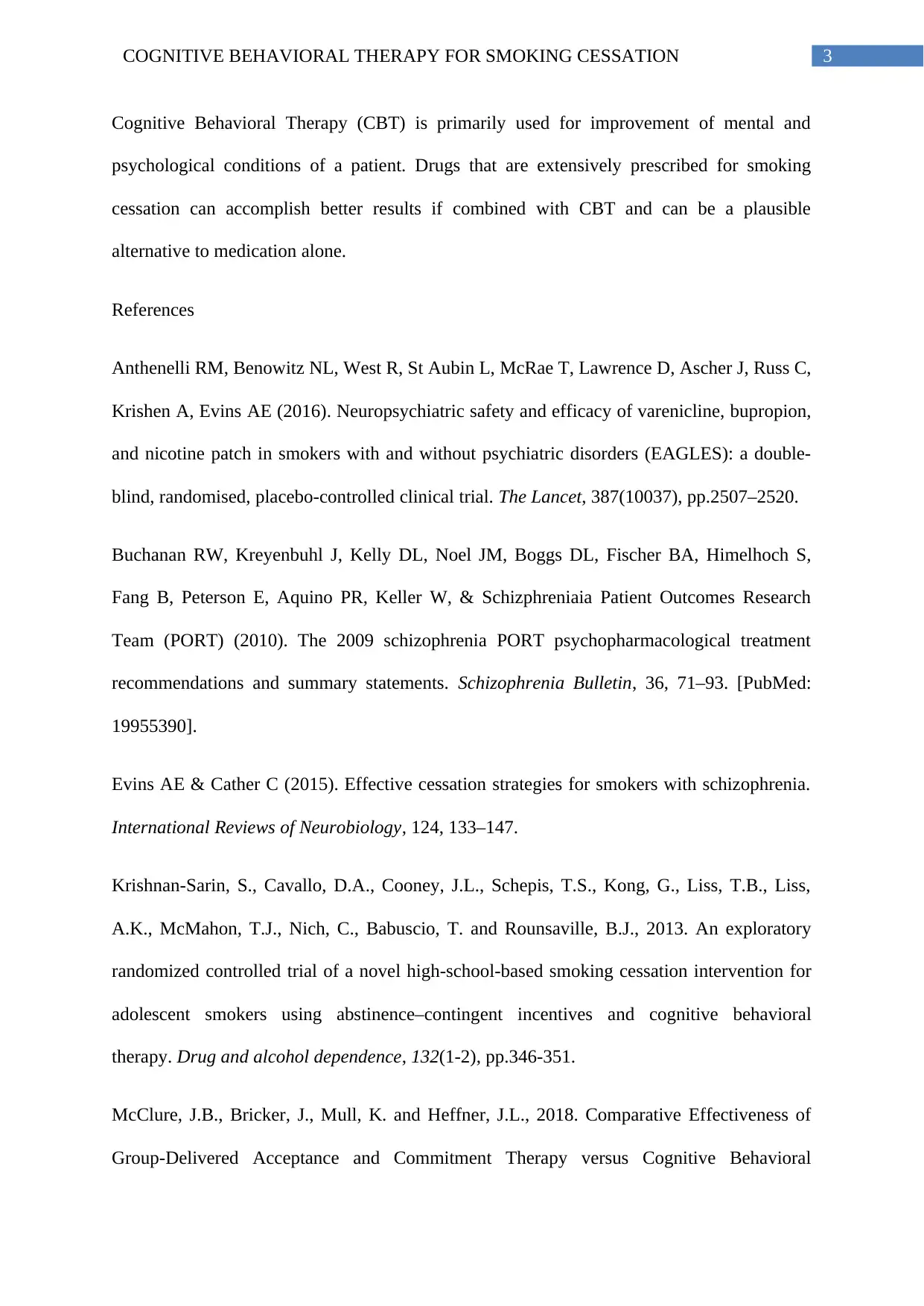
3COGNITIVE BEHAVIORAL THERAPY FOR SMOKING CESSATION
Cognitive Behavioral Therapy (CBT) is primarily used for improvement of mental and
psychological conditions of a patient. Drugs that are extensively prescribed for smoking
cessation can accomplish better results if combined with CBT and can be a plausible
alternative to medication alone.
References
Anthenelli RM, Benowitz NL, West R, St Aubin L, McRae T, Lawrence D, Ascher J, Russ C,
Krishen A, Evins AE (2016). Neuropsychiatric safety and efficacy of varenicline, bupropion,
and nicotine patch in smokers with and without psychiatric disorders (EAGLES): a double-
blind, randomised, placebo-controlled clinical trial. The Lancet, 387(10037), pp.2507–2520.
Buchanan RW, Kreyenbuhl J, Kelly DL, Noel JM, Boggs DL, Fischer BA, Himelhoch S,
Fang B, Peterson E, Aquino PR, Keller W, & Schizphreniaia Patient Outcomes Research
Team (PORT) (2010). The 2009 schizophrenia PORT psychopharmacological treatment
recommendations and summary statements. Schizophrenia Bulletin, 36, 71–93. [PubMed:
19955390].
Evins AE & Cather C (2015). Effective cessation strategies for smokers with schizophrenia.
International Reviews of Neurobiology, 124, 133–147.
Krishnan-Sarin, S., Cavallo, D.A., Cooney, J.L., Schepis, T.S., Kong, G., Liss, T.B., Liss,
A.K., McMahon, T.J., Nich, C., Babuscio, T. and Rounsaville, B.J., 2013. An exploratory
randomized controlled trial of a novel high-school-based smoking cessation intervention for
adolescent smokers using abstinence–contingent incentives and cognitive behavioral
therapy. Drug and alcohol dependence, 132(1-2), pp.346-351.
McClure, J.B., Bricker, J., Mull, K. and Heffner, J.L., 2018. Comparative Effectiveness of
Group-Delivered Acceptance and Commitment Therapy versus Cognitive Behavioral
Cognitive Behavioral Therapy (CBT) is primarily used for improvement of mental and
psychological conditions of a patient. Drugs that are extensively prescribed for smoking
cessation can accomplish better results if combined with CBT and can be a plausible
alternative to medication alone.
References
Anthenelli RM, Benowitz NL, West R, St Aubin L, McRae T, Lawrence D, Ascher J, Russ C,
Krishen A, Evins AE (2016). Neuropsychiatric safety and efficacy of varenicline, bupropion,
and nicotine patch in smokers with and without psychiatric disorders (EAGLES): a double-
blind, randomised, placebo-controlled clinical trial. The Lancet, 387(10037), pp.2507–2520.
Buchanan RW, Kreyenbuhl J, Kelly DL, Noel JM, Boggs DL, Fischer BA, Himelhoch S,
Fang B, Peterson E, Aquino PR, Keller W, & Schizphreniaia Patient Outcomes Research
Team (PORT) (2010). The 2009 schizophrenia PORT psychopharmacological treatment
recommendations and summary statements. Schizophrenia Bulletin, 36, 71–93. [PubMed:
19955390].
Evins AE & Cather C (2015). Effective cessation strategies for smokers with schizophrenia.
International Reviews of Neurobiology, 124, 133–147.
Krishnan-Sarin, S., Cavallo, D.A., Cooney, J.L., Schepis, T.S., Kong, G., Liss, T.B., Liss,
A.K., McMahon, T.J., Nich, C., Babuscio, T. and Rounsaville, B.J., 2013. An exploratory
randomized controlled trial of a novel high-school-based smoking cessation intervention for
adolescent smokers using abstinence–contingent incentives and cognitive behavioral
therapy. Drug and alcohol dependence, 132(1-2), pp.346-351.
McClure, J.B., Bricker, J., Mull, K. and Heffner, J.L., 2018. Comparative Effectiveness of
Group-Delivered Acceptance and Commitment Therapy versus Cognitive Behavioral
Secure Best Marks with AI Grader
Need help grading? Try our AI Grader for instant feedback on your assignments.
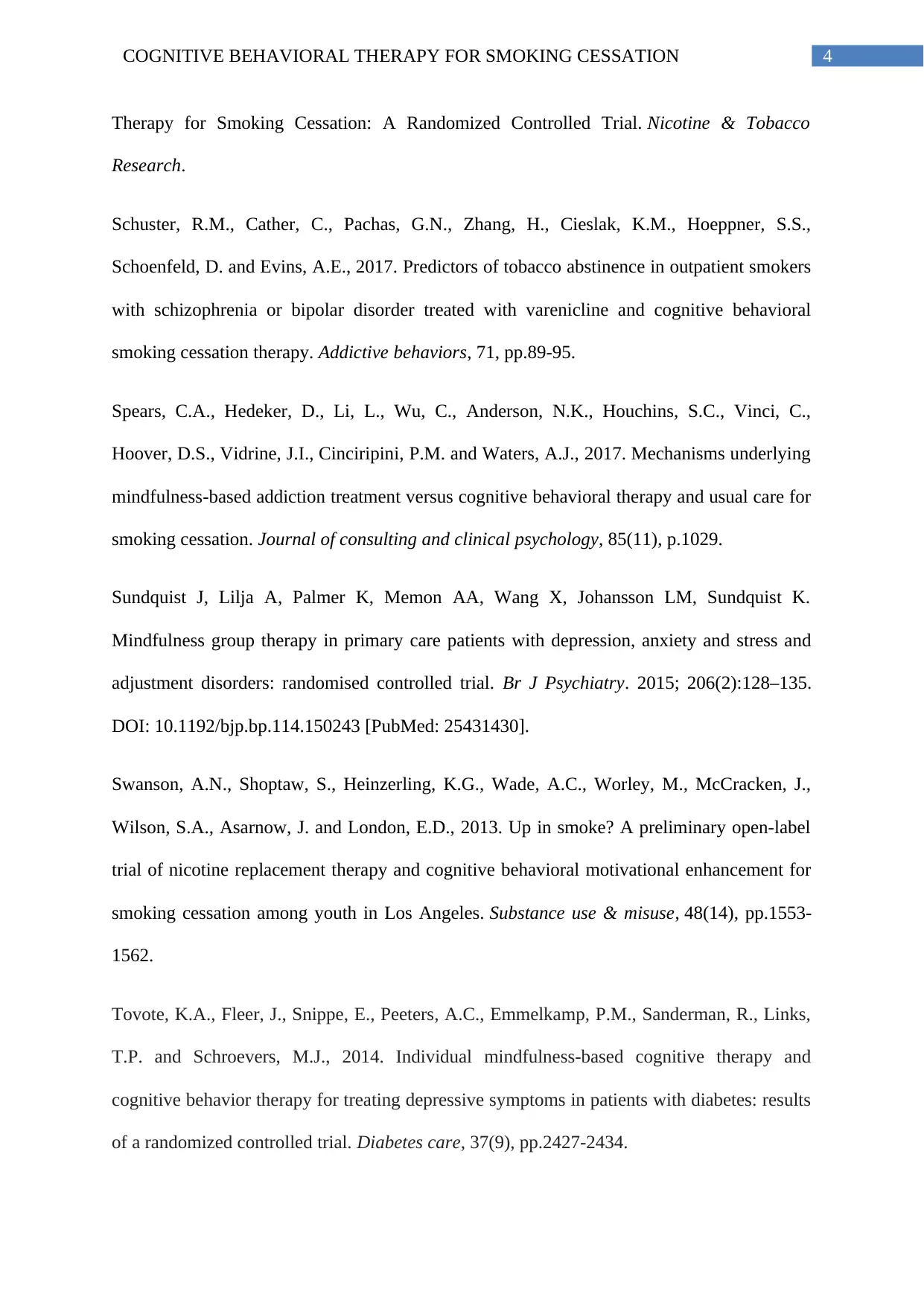
4COGNITIVE BEHAVIORAL THERAPY FOR SMOKING CESSATION
Therapy for Smoking Cessation: A Randomized Controlled Trial. Nicotine & Tobacco
Research.
Schuster, R.M., Cather, C., Pachas, G.N., Zhang, H., Cieslak, K.M., Hoeppner, S.S.,
Schoenfeld, D. and Evins, A.E., 2017. Predictors of tobacco abstinence in outpatient smokers
with schizophrenia or bipolar disorder treated with varenicline and cognitive behavioral
smoking cessation therapy. Addictive behaviors, 71, pp.89-95.
Spears, C.A., Hedeker, D., Li, L., Wu, C., Anderson, N.K., Houchins, S.C., Vinci, C.,
Hoover, D.S., Vidrine, J.I., Cinciripini, P.M. and Waters, A.J., 2017. Mechanisms underlying
mindfulness-based addiction treatment versus cognitive behavioral therapy and usual care for
smoking cessation. Journal of consulting and clinical psychology, 85(11), p.1029.
Sundquist J, Lilja A, Palmer K, Memon AA, Wang X, Johansson LM, Sundquist K.
Mindfulness group therapy in primary care patients with depression, anxiety and stress and
adjustment disorders: randomised controlled trial. Br J Psychiatry. 2015; 206(2):128–135.
DOI: 10.1192/bjp.bp.114.150243 [PubMed: 25431430].
Swanson, A.N., Shoptaw, S., Heinzerling, K.G., Wade, A.C., Worley, M., McCracken, J.,
Wilson, S.A., Asarnow, J. and London, E.D., 2013. Up in smoke? A preliminary open-label
trial of nicotine replacement therapy and cognitive behavioral motivational enhancement for
smoking cessation among youth in Los Angeles. Substance use & misuse, 48(14), pp.1553-
1562.
Tovote, K.A., Fleer, J., Snippe, E., Peeters, A.C., Emmelkamp, P.M., Sanderman, R., Links,
T.P. and Schroevers, M.J., 2014. Individual mindfulness-based cognitive therapy and
cognitive behavior therapy for treating depressive symptoms in patients with diabetes: results
of a randomized controlled trial. Diabetes care, 37(9), pp.2427-2434.
Therapy for Smoking Cessation: A Randomized Controlled Trial. Nicotine & Tobacco
Research.
Schuster, R.M., Cather, C., Pachas, G.N., Zhang, H., Cieslak, K.M., Hoeppner, S.S.,
Schoenfeld, D. and Evins, A.E., 2017. Predictors of tobacco abstinence in outpatient smokers
with schizophrenia or bipolar disorder treated with varenicline and cognitive behavioral
smoking cessation therapy. Addictive behaviors, 71, pp.89-95.
Spears, C.A., Hedeker, D., Li, L., Wu, C., Anderson, N.K., Houchins, S.C., Vinci, C.,
Hoover, D.S., Vidrine, J.I., Cinciripini, P.M. and Waters, A.J., 2017. Mechanisms underlying
mindfulness-based addiction treatment versus cognitive behavioral therapy and usual care for
smoking cessation. Journal of consulting and clinical psychology, 85(11), p.1029.
Sundquist J, Lilja A, Palmer K, Memon AA, Wang X, Johansson LM, Sundquist K.
Mindfulness group therapy in primary care patients with depression, anxiety and stress and
adjustment disorders: randomised controlled trial. Br J Psychiatry. 2015; 206(2):128–135.
DOI: 10.1192/bjp.bp.114.150243 [PubMed: 25431430].
Swanson, A.N., Shoptaw, S., Heinzerling, K.G., Wade, A.C., Worley, M., McCracken, J.,
Wilson, S.A., Asarnow, J. and London, E.D., 2013. Up in smoke? A preliminary open-label
trial of nicotine replacement therapy and cognitive behavioral motivational enhancement for
smoking cessation among youth in Los Angeles. Substance use & misuse, 48(14), pp.1553-
1562.
Tovote, K.A., Fleer, J., Snippe, E., Peeters, A.C., Emmelkamp, P.M., Sanderman, R., Links,
T.P. and Schroevers, M.J., 2014. Individual mindfulness-based cognitive therapy and
cognitive behavior therapy for treating depressive symptoms in patients with diabetes: results
of a randomized controlled trial. Diabetes care, 37(9), pp.2427-2434.
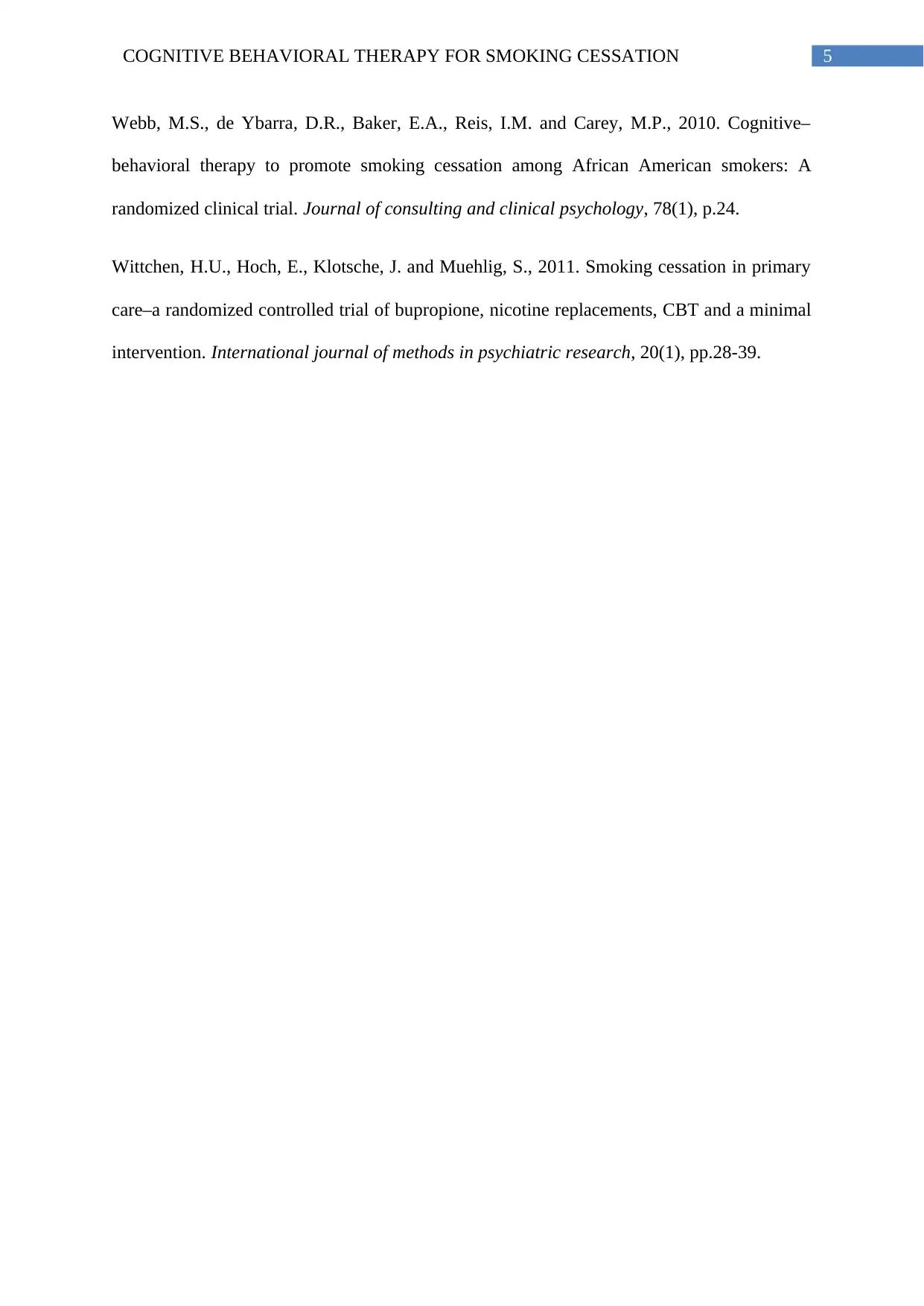
5COGNITIVE BEHAVIORAL THERAPY FOR SMOKING CESSATION
Webb, M.S., de Ybarra, D.R., Baker, E.A., Reis, I.M. and Carey, M.P., 2010. Cognitive–
behavioral therapy to promote smoking cessation among African American smokers: A
randomized clinical trial. Journal of consulting and clinical psychology, 78(1), p.24.
Wittchen, H.U., Hoch, E., Klotsche, J. and Muehlig, S., 2011. Smoking cessation in primary
care–a randomized controlled trial of bupropione, nicotine replacements, CBT and a minimal
intervention. International journal of methods in psychiatric research, 20(1), pp.28-39.
Webb, M.S., de Ybarra, D.R., Baker, E.A., Reis, I.M. and Carey, M.P., 2010. Cognitive–
behavioral therapy to promote smoking cessation among African American smokers: A
randomized clinical trial. Journal of consulting and clinical psychology, 78(1), p.24.
Wittchen, H.U., Hoch, E., Klotsche, J. and Muehlig, S., 2011. Smoking cessation in primary
care–a randomized controlled trial of bupropione, nicotine replacements, CBT and a minimal
intervention. International journal of methods in psychiatric research, 20(1), pp.28-39.
1 out of 6
Your All-in-One AI-Powered Toolkit for Academic Success.
+13062052269
info@desklib.com
Available 24*7 on WhatsApp / Email
![[object Object]](/_next/static/media/star-bottom.7253800d.svg)
Unlock your academic potential
© 2024 | Zucol Services PVT LTD | All rights reserved.

